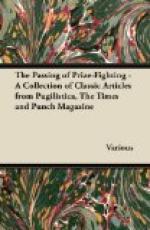Punctually to the minute I was shown into the Editor’s room, where again I was struck by the imaginative adequacy of the surroundings. Before coming to the man himself let me say something of these. The floor was not bare or even sprinkled with sawdust, as it might easily have been, but it was covered by a comfortable carpet, probably from Axminster. Comfort was indeed the note. The desk was neither pitch pine nor teak, but mahogany. Upon it were scattered papers—lightly scattered, although no doubt each was of the most momentous, even tragical import, some bearing the signatures of the most eminent publicists in the land. Yet, such is the domination of this man, they lay there like circulars or election addresses. In the ink-pot was ink. A date rack was proof that the Editor is not superior to the artificial divisions of time.
As I entered, his back was towards me, but none the less I was conscious of power, distinction, a man apart. I have seen many backs, but none more notable than this. Turning he revealed to the full the wonder and mystery of his famous frown—the frown of Jupiter Tonans. Much has been said of this frown, but since no analysis has yet appeared in print I must be permitted to offer one. To begin with, the frown is not only on his face, but (one instinctively knows) all over him. It suffuses him. Could one see, for instance, his knee, one is sure that it would be frowning too.
The effect was terrifying, but I stood my ground. As for the face, where the frown concentrates, it is most curiously divided. Below the masterful nose the frown may be said to be merely threatening; above the firm upper lip it assumes a quality of such dourness as to resemble a scowl. The forehead is corrugated. The ears twitch, especially the left. The eyes emit sparks.
Hitherto he had not spoken; but now he began to unburden himself of those opinions, hopes, fancies and idealistic meditations for which I had come so far to see him. In order that there shall be no ambiguity I have arranged for them to be set up in larger type than the rest of the article. After all, any type will suit my own poor setting, but the jewels, the jewels must be seen.
“Be seated, pray,” he said. “The world,” he added after a long silence, “is in an unusual state. The Versailles Conferences may effect great changes.”
“Everyone hopes,” he remarked after another pause, “that the weather will improve; recently it has been far from invigorating.”
I give his exact words with scrupulous minuteness.
“A permanent peace,” he continued, “based upon equity, cannot but be desired. The Election results,” he added as an afterthought, “are interesting.”
Asked what he thought of the Prime Minister, he pondered deeply for a while and then replied, in carefully measured tones, “I think him an exceptional man.”
Pressed as to the League of Nations, he considered the matter for some minutes and then said, “It is a fine notion. We might all be the happier if it came.”




